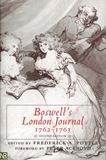Boswell’s London Journal 1762-1763
Editor: Frederick A. Pottle
Foreward by Peter Ackroyd; Preface by Christopher Morley
New York: McGraw Hill; London: Heinemann 1950, 1963; Edinburgh: Edinburgh University Press 1991; New Haven: Yale University Press 1992; Edinburgh: Edinburgh University Press; New Haven: Yale University Press 2004
ISBN: 9780748621460; 9780300093018
The publication of this volume marks a milestone in the history of English Literature, for here is an intimate journal of James Boswell, written almost two hundred years ago, which has never before been published. It is not often that the general reader has fore-knowledge that he is privileged to be in at the birth of a classic.
Boswell was only twenty-two years old when he wrote this journal, in which he set down the record of nine momentous months in his life—more momentous, even, than he knew. He had obtained the reluctant consent of his father to leave Scotland and live in London. His father wanted him to be a lawyer. Boswell wanted to be an officer in the Footguards so that he might remain in London. But behind this conflict there was still another, only half realized by the young man himself, which manifested itself in an urgent literary gift and a passion for authorship.
This London Journal, then is the intimate record of the dual struggle—of son to assert his independence from father, of literary genius to save itself from extinction. To young Boswell, the latter battle appeared lost, but actually it was brilliantly won in the writing of this very journal. In the light of all the new evidence, it seems certain that Boswell’s place in English literature will have to be reappraised, and that the biographer of Samuel Johnson will emerge as a figure far greater than most people have supposed him to be.
The journal is remarkable for its frankness and honest in recording the facts of the author’s life, as well as for the shrewdness with which he dissects his own motives. For example, here we see in the carefully planned amorous adventure with the actress Louisa, an its surprise ending, as well as in his other more casual escapades, his early yieldings to the strong licentious streak in his nature which was to color his life almost to the end. Here, too, is the vivid panorama of eighteenth-century London—the high life of balls at Northumberland House and of gay gatherings with Lord Eglinton, as well as the low life of park and alley after dark. We accompany the young man to the House of Lords to hear King George III make his address from the throne; and we go with him to a cock fight and to a public execution. We sit with him in spirited conversation with David Garrick, Thomas Sheridan, James Macpherson, and at night we prowl the crooked streets of London with him, on one occasion disguised as a blackguard, in pursuit of a wench. Finally, we drop in with him one day at the bookshop of Mr. Davies on Russell Street and there witness the fateful first meeting with Doctor Johnson.
The reader will perhaps compare this journal with the Diary of Pepys and the Confessions of Rousseau. It has points of likeness to each. Yet, Boswell may emerge as the greatest diarist of all the three, for he does not set down uninspired matters of fact as Pepys often does; nor, in his frankness and honesty, does the reader detect, as in Rousseau, any purpose to shock, any sense that the author was avowedly writing with History and fame peering over his shoulder.
Frederick A. Pottle (1897–1987) was Sterling Professor of English Emeritus at Yale University; editor, bibliographer, and biographer of James Boswell, he was head of the Yale Boswell Editions from 1949 to 1979.
Review
This journal … has been admirably edited and annotated by Frederick A. Pottle.
[T]here are the self-portraits, in which an attempt is made to set down truthfully all experiences, irrespective of their historical or career importance. The extreme difficulty of such self-portraiture is that a man who has reached the degree of self-consciousness presupposed by the desire to paint his own portrait has almost invariably also developed an ego-consciousness that paints himself painting himself and inevitably produces a theatrical image. Boswell, indeed, is perhaps the only one of the my-heart-laid-bare boys who reached the one without developing the other.
W. H. Auden, The New Yorker, November 25, 1950
